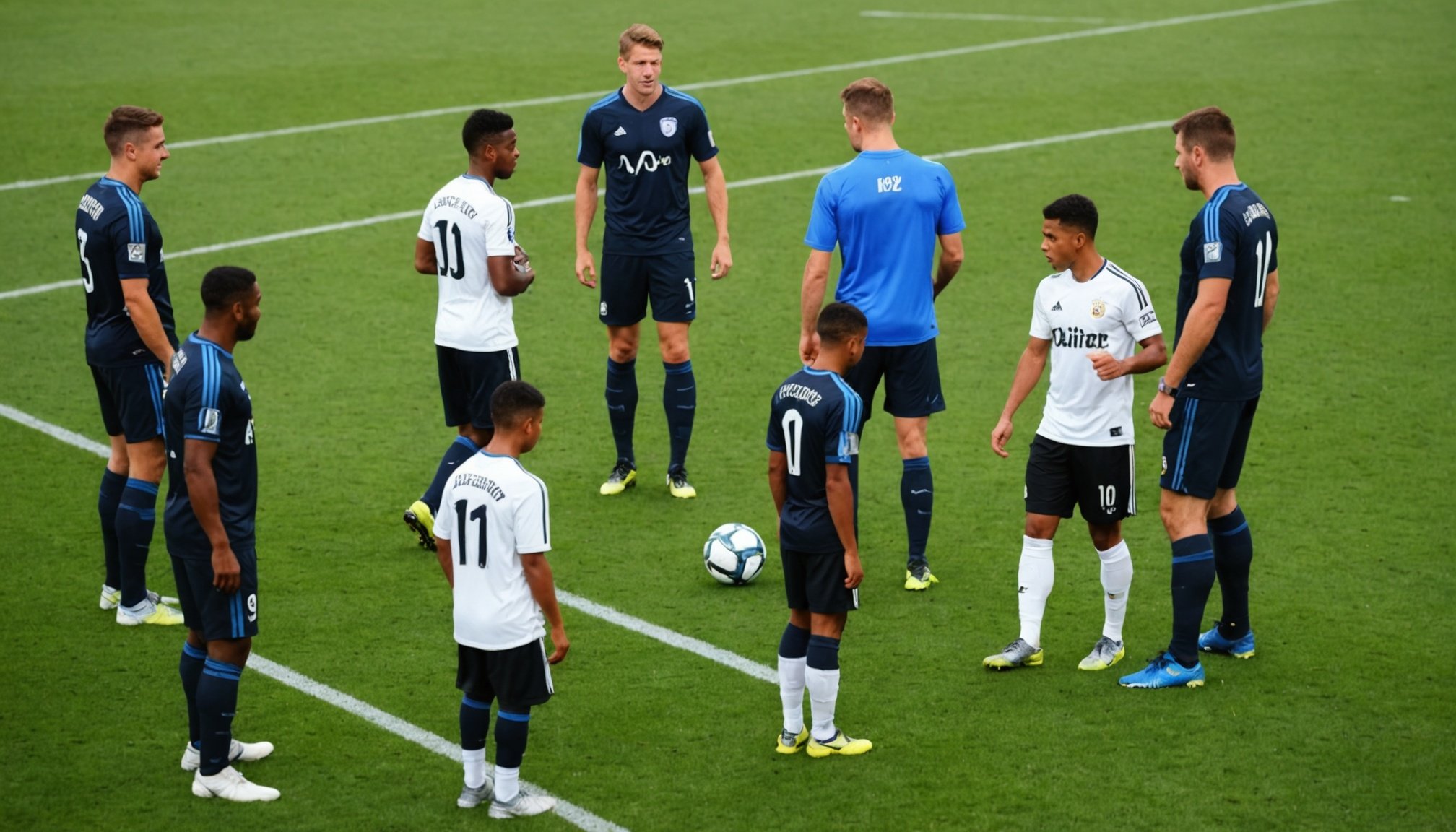Understanding Sports Psychology in Football
The field of sports psychology plays a crucial role in enhancing football performance by focusing on understanding and improving individual and team dynamics. As a discipline, sports psychology aims to address the mental and emotional factors that influence athletes’ performance, offering insights that go beyond physical training.
Effective team dynamics hinge on several psychological principles. For instance, the concepts of motivation and resilience are fundamental. Motivation theories, such as self-determination theory, highlight the importance of intrinsic and extrinsic motivators in driving team members to excel. Resilience, on the other hand, involves cultivating mental toughness to cope with pressure and adversity during matches.
In the same genre : Enhancing football performance: how wearable technology transforms player potential
The relationship between psychology and overall team performance is profound. Improved focus, reduced anxiety, and better communication skills contribute significantly to superior game outcomes. Psychologists work with football teams to foster these attributes, enabling players to maintain peak performance during high-stakes situations.
In summary, sports psychology is not just an adjunct to physical training but a cornerstone of strategic preparation that strengthens both the mental resilience and the collective competence of football teams. Consequently, integrating psychological support into football coaching can lead to more cohesive and high-performing teams.
In the same genre : Impact of regulatory changes on football coaching techniques throughout the uk: a deep dive
Techniques for Enhancing Communication
Enhancing communication within a football team is crucial for success. Effective team communication supports both mental and physical coordination, a fundamental aspect of sports psychology techniques.
Active Listening Strategies
Active listening is a technique that significantly improves team communication. Players who actively listen are more equipped to understand instructions and respond accurately. This strategy involves paying full attention, asking clarifying questions, and providing thoughtful feedback. In essence, active listening cultivates a communicative environment where team members feel heard and acknowledged.
Non-verbal Communication
Non-verbal cues, such as body language and eye contact, play an essential role in communication among team members. In high-pressure games, non-verbal communication helps convey messages without disrupting gameplay. Encouraging awareness and proper usage of these cues can lead to smoother on-field interactions and effective communication.
Feedback Mechanisms
Regular feedback mechanisms are vital for improving team communication processes. Implementing structured feedback sessions encourages transparency and openness. By creating an environment where players feel comfortable providing and receiving feedback, teams can address misunderstandings and foster a culture of continuous improvement. This, in turn, directly impacts team performance and dynamics positively.
Fostering Team Cohesion
Building strong team cohesion in football is essential for effective group dynamics and overall success. Trust among team members is fundamental, paving the way for open communication and collective commitment. Players must have confidence in each other’s abilities and intentions to foster a collaborative environment. This trust can be strengthened through regular team-building exercises designed to encourage bonding and mutual respect.
Group dynamics are significantly improved when players participate in exercises that enhance understanding and empathy. Activities such as trust falls, problem-solving challenges, and role-playing scenarios allow team members to see different perspectives and work together harmoniously. Regular team meetings and social gatherings can also promote solidarity, creating a sense of community beyond regular practice sessions.
Moreover, establishing shared goals is critical for aligning individual ambitions with team objectives. When team members work towards common objectives, unity is naturally enhanced as everyone strives for the same accomplishments. Coaches play a pivotal role in setting these goals, ensuring they are tailored to the team’s strengths and weaknesses. By integrating team-building initiatives and shared objectives, football teams can achieve greater cohesion, ultimately leading to better performance on the field.
Case Studies and Examples
Understanding sports psychology in football can be exemplified through real-world case studies. High-performing teams often attribute their success to the effective utilization of psychological strategies. For instance, the Germany national team, known for its strong team dynamics, has credited part of its triumphs to the incorporation of sports psychology practices. Their focus on fostering a resilient mindset and maintaining intrinsic motivation significantly enhanced their football performance.
High-Performing Teams
In successful teams like FC Barcelona, psychological techniques such as visualization and mental resilience building have improved concentration and reduced anxiety during critical matches. Barcelona’s consistency in high-stakes games results from combining traditional training with psychological support.
Individual Player Improvement
Sports psychology has also transformed individual players. Cristiano Ronaldo, for example, employs mental imagery and self-motivation techniques to maintain peak performance levels. His commitment to sports psychology principles has kept him at the top of his game, influencing his approach and mindset.
Coaching Strategies
Cohesive coaching strategies incorporating psychological practices have yielded profound impacts. Liverpool FC’s approach under coach Jürgen Klopp highlights how blending team dynamics with sports psychology enhances player morale and unity. This strategy also involves setting clear shared goals, contributing to their formidable team cohesion.
Measuring Team Performance
In football, evaluating team performance requires careful consideration of various metrics and strategies to ensure ongoing improvement. These metrics help teams identify strengths and areas needing development, contributing to their overall success.
Key Performance Indicators (KPIs)
Key Performance Indicators offer quantifiable measures of success, such as goals scored, passes completed, and possession percentage. Tracking these metrics provides objective insights into a team’s performance. Through KPIs, teams can set specific, measurable goals that align with their tactical plans, serving as an evidence-based foundation for improvement.
Psychological Assessments
Psychological assessments complement traditional performance metrics by evaluating athletes’ mental state and resilience. Tools like questionnaires and observations help psychologists understand players’ attitudes, stress levels, and motivation, vital for tailoring interventions that boost psychological well-being and performance.
Continuous Improvement Strategies
Continuous improvement is crucial for sustaining high performance. Implementing strategies such as periodic reviews and feedback sessions fosters a culture of progression. These strategies encourage teams to adjust their tactics and psychological support plans, thereby ensuring ongoing development. By integrating performance metrics with psychological assessments and improvement strategies, teams can maintain their competitive edge.
Psychological Principles Relevant to Football
In the realm of sports psychology, understanding how psychological principles impact football performance is critical. Key concepts such as motivation and resilience hold significant sway over players’ mindsets during high-pressure situations.
Motivation Theories
Incorporating motivation theories in football helps design strategies that elevate team dynamics. Self-determination theory, for instance, emphasizes intrinsic motivators like passion for the game, and extrinsic factors like rewards. By understanding these motivators, coaches can tailor approaches that inspire athletes to perform at their best.
Resilience Building
Resilience is the mental toughness needed to navigate the ups and downs of competitive football. Techniques such as cognitive restructuring and stress management drills strengthen players’ ability to remain focused under duress. This resilience translates into improved stamina and better handling of challenging game scenarios.
Role of Mindset in Performance
A player’s mindset directly affects their performance and determines their response to setbacks. Developing a growth mindset encourages athletes to view challenges as opportunities for development rather than obstacles. Emphasizing the value of effort and learning over innate talent, this approach fosters an adaptive and persistent attitude that can significantly enhance on-field achievements.










